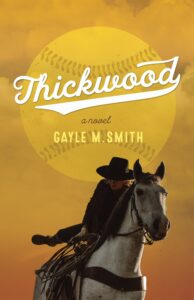Historical fiction novelist Gayle M Smith joins me today to chat about her newest book, Thickwood.

Bio:
Gayle grew up in Alberta. As a young child she distinctly remembers her family life on a mixed subsistence farm in central Alberta. As a young child she developed a love for animals, especially horses, and a love for reading and writing illustrated stories.
In 1989 Gayle married a Saskatchewan farmer and settled into rural life to raise three children, numerous crops, purebred and commercial cattle, and horses. Gayle and her husband used the local pasture program for their commercial cattle. They also used their horses to gather and trail their cattle to various home pastures.
Gayle was accepted into the 2011 Saskatchewan Writers’ Guild Mentorship program, where she drafted her first novel manuscript. Gayle has also been a member of a writer’s group for over ten years. In 2015 Gayle graduated from the University of Saskatchewan with a Master of Fine Arts in Writing.
Yearly wilderness pack trips in Northern Saskatchewan with her horses inspire her writing She also rides in the mountains, competes in numerous equestrian events, and owns and operates a horse boarding facility. Gayle’s love of the environment, history, and adventure shines in her writing. She daily interacts with her beloved partner, her family, her horses, and her rural home, while contemplating and exploring through her writing, the struggle and dilemma of being human.
Welcome, Gayle. Please tell us about your current release.
Willomena Swift, an isolated, ranch-raised young woman, home from playing in the All-American Girls Professional Baseball League, struggles to understand how she can raise horses when her family lease, in the transition zone between forest and prairie, will be turned over to the new PFRA pasture. While facing numerous challenges with a wild stallion and his owner, once her coach and now heading up the pasture’s development, Willo remembers her years playing baseball and, amidst romance and tragedy, struggles to assert her rightful place and realize her dreams.
What inspired you to write this book?
I love reading and I especially enjoy historical fiction that includes nature, animals and intriguing characters. I am live on my farm surrounded by horses. I find horses incredibly intelligent and inspiring. I have had many adventures and close calls with my horses in the wilderness. The main character, Willo, has been a muse of mine for many years. I had written about her in many different settings, time periods, and at different ages. When I heard that the federal cooperative pasture system was going to end in western Canada I started to research the historical beginnings of cooperative pastures. I found the 1940s and 1950s a very interesting time as rural areas were still largely without services and urban areas were growing and modernising. I liked the contrast between urban and rural living, especially with my love of horses and my growing understanding of the main character in Thickwood. Then, I was intrigued to discover that many women from Canada were recruited to play baseball in the All-American Girls Professional Baseball League. It was a lot of fun researching the towns and cities of Illinois in 1950.
Excerpt from Thickwood:
“Some peoples call you misisahk. It means horsefly. You fly with the horses . . . you’re small, with a big bite.”
What exciting project are you working on next?
Many people ask me if a sequel to Thickwood is a possibility. It is something I am considering. However, I have already started another historical novel, set in the same time period. It will also feature horses and a variety of characters on an adventure together.
When did you first consider yourself a writer?
Becoming a writer develops in stages. I considered myself a developing and unpublished writer many years ago. When I was accepted into a mentorship program and then into the MFA in Writing program at the University of Saskatchewan, I felt some claim to be an emerging writer. Now after being published, I call myself a writer. I think about writing all the time and I write in the winter season.
Do you write full-time? If so, what’s your workday like? If not, what do you do other than write and how do you find time to write?
At first, I wrote in the evenings or early mornings around my daytime work. Then I adjusted my work schedule so I could include more time for writing. Now I am self-employed and in charge of my own schedule. Winter is my season of writing and summer is the season of developing a sensory bank and collecting thoughts and experiences.
What would you say is your interesting writing quirk?
I get up very early in the morning— in a dream state—when I’m on a writing binge. It is very satisfying.
As a child, what did you want to be when you grew up?
I wanted to be a veterinarian, but I soon realized the sight of blood and needles terrified me. How disappointing! I have become more used to doctoring animals but it is not within my comfort zone. I always read a lot from a very young age and wrote my own little books and illustrated them. I still have a couple of these endearing projects. They are about horses, of course.
Anything additional you want to share with the readers?
I am intrigued with how history can repeat itself. There are contemporary themes in historical fiction. Historical fiction can have a modern sensibility, as characters deal with their emotions, relationships, and rising conflicts. As a springboard from research, I use my imagination to create possibilities for my characters.
